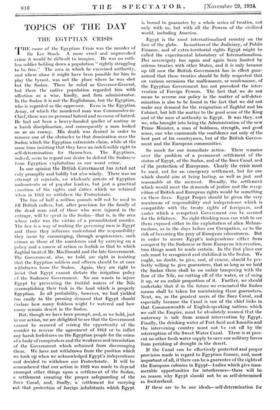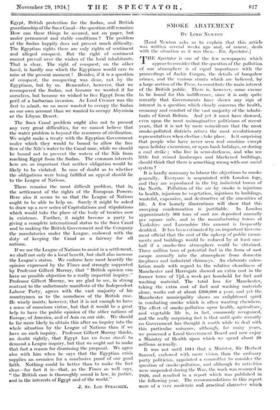TOPICS OF THE DAY
THE EGYPTIAN CRISIS
THE cause of the Egyptian Crisis was the murder of Sir Lee Stack. A more cruel and unprovoked crime it would be difficult to imagine. He was no ruth- less soldier holding down a population " rightly struggling to be free." The area in which he exercised authority, and where alone it might have been possible for him to play the tyrant, was not the place where he was shot but the Sudan. There he ruled as Governor-General, but there the native population regarded him with affection as a wise, kindly, and firm administrator. In the Sudan it is not the Englishman, but the Egyptian, who is regarded as the oppressor. Even in the Egyptian Army, of which the murdered man was Commander-in- Chief, there was no personal hatred and no cause of hatred. He had not been a heavy-handed queller of mutiny or a harsh. disciplinarian, and consequently a man looked on as an enemy. His death was desired in order to remove one of the obstacles to that domination over the Sudan which the Egyptian extremists claim, while at the same time insisting that they have an indefeasible right to self-determination for themselves. The Egyptians, indeed, seem to regard our desire to defend the Sudanese from Egyptian exploitation as our worst crime.
In our opinion the British Government has acted not only promptly and boldly but also wisely. There was no attempt at reprisals, no wholesale arrests of Egyptian malcontents or of popular leaders, but just a practical ssertion of the rights and duties which we retained when in 1922 we withdrew the Protectorate.
The fine of half a million pounds will not be used to fill British coffers, but, after provision for the family of the dead man and of those who were injured in the outrage, will be spent in the Sudan—that is, in the area whose ruler was the victim of a premeditated murder. The fine is a way of making the governing men in Egypt and those they influence understand the responsibility they incur by encouraging, through acquiescence, such crimes as those of the murderers and by carrying on a policy and a course of action so foolish as that to which Zaghlul treated Mr. MacDonald and the late Government. The Government, also, we hold, are right in insisting that the Egyptian soldiers and officers should be at once withdrawn from the Sudan. Again, they are right to insist that Egypt cannot dictate the irrigation policy of the Sudanese Government. No one wants to injure Egypt by preventing the fruitful waters of the Nile accomplishing their task in the land which is properly Egyptian. In all probability, however, we had yielded t oo easily to the pressing demand that Egypt should 0.eclare how many feddans might be watered and how many remain desert in the Sudan.
But, though we have been prompt, and, as we hold, just in our action, we are delighted to see that the Government cannot be accused of seizing the opportunity of the murder to reverse the agreement of 1922 or to inflict any harsh forfeitures on the Egyptian people for the crime of a body of conspirators and the weakness and irresolution of the Government which refrained from discouraging them. We have not withdrawn from the position which we took up when we acknowledged Egypt's independence and decided to withdraw our Protectorate. It will be remembered that our action in 1922 was made to depend amongst other things upon a settlement of the Sudan, a settlement ensuring the proper safeguarding of the Suez Canal, arid, finally, —a" f. et t 1 e c t for carrying out that protection of foreign inhabitants which Egypt is bound to guarantee by a whole series of treaties, not only with us, but with all the Powers of the civilized world, including America.
Egypt is the most internationalized country on the face of the globe. In matters of the Judiciary, of Public Finance, and of extra-territorial rights Egypt might be called the experimental laboratory of Internationalism. Her sovereignty has again and again been limited by solemn treaties with other States, and it is only because up till now the British Government has in effect guar- anteed that these treaties should be fully respected that on various occasions the malfeasance, or nonfeasance, of the Egyptian Government has not provoked the inter- vention of Foreign Powers. The fact that we do not mean to reverse our policy in the matter of self-deter- mination is also to be found in the fact that we did not make any demand for the resignation of Zaghlul and his Cabinet, but left the matter to the good sense of the King and of the men of authority in Egypt. It was they, not we, who brought into being the Administration of the new Prime Minister, a man of boldness, strength, and good sense, one who commands the confidence not only of the best part of his countrymen, but of the British Govern- ment and the European communities.
So much for our immediate action. There remains over the problem of a permanent settlement of the status of Egypt, of the Sudan, and of the Suez Canal, and of the protection of Europeans. Clearly the crisis must be used, not for an emergency settlement, but for one which should aim at being lasting, as well as just and reasonable at the moment. Broadly, the settlement which would meet the demands of justice and the recog- nition of British and European rights would be something cn these lines. Egypt Proper should be given the very maximum of responsibility and independence which is compatible with the treaty rights of foreigners, and under which a ccmpetent Government can be scoured for the fellaheen. No right-thinking man can wish to see them exposed either to the exploitation of alien Moham- medans, as in the days before our Occupation, or to the risk of becoming the prey of European adventurers. But in order to secure Egypt's independence either from conquest by the Sudanese or from European intervention, two things must be made certain. In the first place our rule must be recognized and stabilized in the Sudan. We ought, no doubt, to give, and, of course, should be per- fectly willing to give guarantees, that as long as we hold the Sudan there shall be no unfair tampering with the flow of the Nile, no cutting off of the water, or of using it up, or an unfair proportion of it. Further, we should undertake that if in the future we evacuated the Sudan means shall be taken for maintaining these guarantees. Next, we, as the greatest users of the Suez Canal, and especially because the Canal is one of the chief links in that Commonwealth of English-speaking nations which we call the Empire, must be absolutely assured that the waterway is safe from armed intervention by Egypt. Finally, the drinking water of Port Said and Ismailia and the intervening country must not be cut off by the interruption of the Sweet Water Canal. There is at pres- ent no other fresh water supply to save our military forces from perishing of drought in the desert.
If the Canal can be effectively protected and proper provision made in regard to Egyptian finance, and, most important of all, if there can be a guarantee of the rights of the European colonies in Egypt—bodies which give innu- merable opportunities for interference—there will be no reason why Egypt should not be as self-determined as Switzerland.
If these are to be our ideals—self-determination for Egypt, British protection for the Sudan, and British guardianship of the Suez Canal—the question still remains: How can these things be secured, not on paper, but under permanent and stable conditions ? The problem of the Sudan happily does not present much difficulty. The Egyptian rights there are only rights of sentiment and alleged conquest. But the right of sentiment cannot prevail over the wishes of the local inhabitants. That is clear. The right of conquest, on the other hand, is hardly one which the Egyptians would care to raise at the present moment ! Besides, if it is a question of conquest, the conquering was done, not by the Egyptians, but by us. Remember, however, that we reconquered the Sudan, not because we wanted it for ourselves, but because we wished to free Egypt from the peril of a barbarian invasion. As Lord Cromer was the first to admit, we no more wanted to occupy the Sudan on our own account than we wanted to occupy Abyssinia or the Libyan Desert.
The Suez Canal problem ought also not to present any very great difficulties, for we cannot believe that the water problem is beyond the resources of civilization. We might make a treaty with the Egyptian Government under which they would be bound to allow the free flow of the Nile's water to the Canal zone, while we should be bound not to prevent the waters of the Nile from reaching Egypt from the Sudan. The common interests here are so important that neither obligation would be likely to be violated. In case of doubt as to whether the obligations were being fulfilled an appeal should lie to the League of Nations.
There remains the most difficult problem, that is, the settlement of the rights of the European Powers. Here also it seems to us that the League of Nations ought to be able to help us. Surely it might be asked to draw up a new series of Capitulations and stipulations which would take the place of the body of treaties now in existence. Further, it might become a party to giving a complete international status to the Suez Canal and to making the British Government and the Company the mandatories under the League, endowed with the duty of keeping the Canal as a fairway for all nations.
If we use the League of Nations to assist in a settlement, we shall not only do a local benefit, but shall also increase the League's status. We endorse here most heartily the opinion expressed by the Times and strongly supported by Professor Gilbert Murray, that " British opinion can have no possible objection to a really impartial inquiry." Professor Gilbert Murray, we are glad to see, in strong contrast to the unfortunate manifesto of the Independent Labour Party, agrees with the vast majority of his countrymen as to the soundness of the British case. He wisely insists, however, that it is not enough to have a sense of conscious virtue, but that it would be a great help to have the public opinion of the other nations of Europe, of America, and of Asia on our side. We should be far more likely to obtain this after an inquiry into the whole situation by the League of Nations than if we have no such inquiry. Professor Gilbert Murray thinks, no doubt rightly, that Egypt has no locus standi to demand a League inquiry, but that we ought not to make that fact a reason for dismissing the proposal. We agree also with him when he says that the Egyptian crisis supplies an occasion for a conclusive proof of our good faith. Nothing could be better than to make the fact clear—for fact it is—that, as the Times so well says, " the British case is thoroughly sound in law, in justice, and in the interests of Egypt and of the world."
J. ST. LOE STRACHEY.



























































 Previous page
Previous page